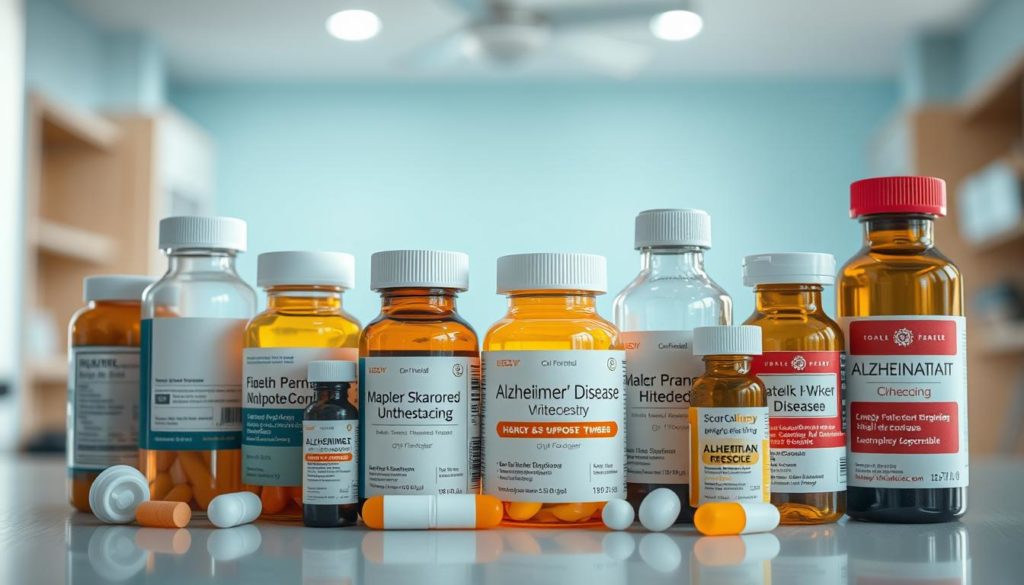Did you know over 6 million Americans live with Alzheimer’s, with no cure yet? This fact shows how vital cognitive decline therapies are. They help manage symptoms and slow dementia’s progress. Alzheimer’s is the most common dementia type, but there are various anti-dementia pharmaceuticals to help.
It can be hard to understand all the medication options. But it’s key to making the right treatment choices. There are drugs to slow the disease and some that ease symptoms, and many are FDA-approved. Talking with doctors and having treatments checked by experts is important for good dementia care.
Introduction to Dementia and Alzheimer’s Treatments
Dementia and Alzheimer’s disease affect millions around the globe. Learning about Alzheimer’s Treatments is key in dealing with these complex conditions. At the core of Alzheimer’s is the beta-amyloid protein that interrupts brain function.
Dementia medications can be split into two main types. Some attempt to change how the disease progresses. Others, like Memory-Enhancing Drugs, aim to improve cognitive functions hit by the disease.

The FDA has okayed several drugs specifically for Alzheimer’s. These medications work at different stages. They either slow the disease or ease cognitive symptoms. This makes everyday life easier for patients.
Understanding these Memory-Enhancing Drugs helps those dealing with dementia make better health choices. Knowing the roles of these drugs helps patients and caregivers pick the best treatment options. This approach is crucial in creating effective treatment plans and boosting the life quality of those with these conditions.
FDA-Approved Medications for Alzheimer’s Disease
Alzheimer’s disease is a challenging neurodegenerative disease. Yet, recent years have brought progress in treatment options. Now, we have FDA-Approved Alzheimer’s Disease Drugs. These drugs work to manage symptoms and sometimes slow the disease’s pace.
These drugs are grouped by the disease stage and symptoms they address. We have main categories:
- Cholinesterase Inhibitors: These help with cognitive function in the early to moderate stages.
- Glutamate Regulators: They protect brain cells in moderate to severe stages by controlling glutamate levels.
- Combination Therapy: This approach uses drugs from the first two categories to get the best results.

| Medication | Stage | Purpose | Examples |
|---|---|---|---|
| Cholinesterase Inhibitors | Early to Moderate | Improve cognition and memory | Donepezil, Rivastigmine |
| Glutamate Regulators | Moderate to Severe | Prevent neuron damage | Memantine |
| Combination Therapy | All stages | Comprehensive symptom management | Namzaric (Donepezil + Memantine) |
These FDA-Approved Alzheimer’s Drugs are key in fighting Alzheimer’s. They offer hope to many facing this disease. By understanding these drugs, navigating treatment becomes easier.
Drugs That Change Disease Progression
We’re exploring meds that aim to change the path of brain diseases. These include Aducanumab, Donanemab, and Lecanemab. They focus on amyloid plaques in the brain linked to Alzheimer’s.
Amyloid-Targeting Approaches
Amyloid-targeting drugs are a big step ahead in fighting brain diseases. Aducanumab, for one, helps remove amyloid plaques tied to Alzheimer’s. Donanemab and Lecanemab also aim at these plaques, bringing hope for a better future.
Here’s a quick comparison of the three drugs:
| Drug | Mechanism of Action | Current Status | Key Benefits |
|---|---|---|---|
| Aducanumab | Targets beta-amyloid plaques | FDA Approved | Reduces amyloid plaques in the brain |
| Donanemab | Targets a modified form of beta-amyloid | Phase 3 Trials | Potential delay in cognitive decline |
| Lecanemab | Targets protofibrils | Phase 2b Trials | May slow disease progression |
Patient Eligibility and Monitoring
Figuring out who can get these drugs requires strict checks. Genetic testing for the ApoE ε4 allele is important here. It helps predict treatment effects. Also, watching for side effects like Amyloid-related imaging abnormalities (ARIA) is key.
By keeping a close eye on patients, we increase treatment safety and success. With amyloid-focused treatments and good patient care, there’s new hope in battling brain diseases.
Medications for Symptomatic Treatment
It’s important to know about the medicines for treating dementia symptoms. They make life better for those affected. We look at three main types of medicines: Cholinesterase Inhibitors, Glutamate Regulators, and Combination Therapy.
Cholinesterase Inhibitors
Drugs like Donepezil, Rivastigmine, and Galantamine are often used for Alzheimer’s symptoms. They work by raising acetylcholine levels, which helps with memory and thinking. These drugs slow down the enzyme that destroys acetylcholine, sometimes improving symptoms.
Glutamate Regulators
Memantine is a Glutamate Regulator. It changes how the glutamate neurotransmitter, important for memory, works. It is given for moderate to severe Alzheimer’s, alone or with other drugs. It stops glutamate from overworking, protecting brain cells from damage.
Combination Therapy
Namzaric mixes Donepezil and Memantine. It targets Alzheimer’s in two ways for better results. Studies show this mix helps more with cognitive skills and daily tasks than one medicine alone.
| Medication | Type | Example Brands | Common Side Effects |
|---|---|---|---|
| Donepezil | Cholinesterase Inhibitor | Aricept | Nausea, Diarrhea, Insomnia |
| Rivastigmine | Cholinesterase Inhibitor | Exelon | Weight Loss, Vomiting, Weakness |
| Galantamine | Cholinesterase Inhibitor | Razadyne | Dizziness, Headache, Fatigue |
| Memantine | Glutamate Regulator | Namenda | Constipation, Confusion, Dizziness |
| Donepezil + Memantine | Combination Therapy | Namzaric | Hypertension, Stuffy Nose, Fatigue |
Managing Non-Cognitive Symptoms
Dealing with non-cognitive symptoms is key in dementia care. These include behaviors like agitation, feeling anxious, and trouble sleeping. It’s very important to know how different drugs can help and what their risks are.
Orexin receptor antagonists are a type of medicine used here. They help sort out sleep problems and fight insomnia. This means patients won’t be up all night as much. Trials have shown these drugs make a real difference in sleep quality for patients.
Another group of drugs used is atypical antipsychotics. They are used for calming agitation and treating psychosis in those with dementia. However, they come with serious risks, especially in older people. The FDA has warned about these. Doctors need to think carefully about these risks versus the benefits.
“Non-cognitive symptoms can often be more challenging for both patients and caregivers than cognitive symptoms. Effective management is essential for improving quality of life.” – Dr. Jane Watson
Here’s a quick comparison of the main medications used for behavioral and psychological symptoms in dementia:
| Medication Type | Primary Use | Benefits | Risks |
|---|---|---|---|
| Orexin Receptor Antagonists | Sleep Disturbances | Improved sleep quality, reduced insomnia | Potential for daytime drowsiness |
| Atypical Antipsychotics | Agitation and Psychosis | Reduction in aggression, better mood regulation | Increased risk of cardiovascular events in older patients |
Dementia Medications: Benefits and Risks
When looking at dementia meds, weighing the good against potential side effects is key. Doctors and patients need to work together to make smart choices. This balance is crucial for effective treatment.
Efficacy of Treatments
Medicines for Alzheimer’s vary in their effectiveness. Some improve memory and daily chores for patients. Still, how each person responds can differ.
Studies show some meds may slow cognitive decline. It’s key to know that while they improve life quality, they don’t cure Alzheimer’s. Patients should have realistic hopes about these treatments.
Potential Side Effects
Dementia meds come with big benefits but also risks. Side effects like nausea or diarrhea are common. Some may face allergic reactions, which means keeping an eye on symptoms is essential.
A concern worth mentioning is ARIA, seen in brain scans. Monitoring these side effects emphasizes the importance of doctor-patient talks on Alzheimer’s meds safety.
Making the choice to start meds involves looking closely at the pros and cons. Informed patients and doctors aim for the best outcomes together.
Participating in Clinical Trials
Taking part in Alzheimer’s Clinical Studies and Dementia Medication Trials is very valuable. It helps push forward the treatment of dementia. These trials are key to creating new treatments for Alzheimer’s and related diseases.
Being part of these studies gives people access to new treatments early on. If you’re a patient or caregiver, it’s important to know how you can join in. You can start by looking at the National Institute on Aging (NIA). They have a lot of information on ongoing Alzheimer’s Clinical Studies and how to find trials that fit your needs.
Before you decide to join a clinical trial, think about a few things:
- Eligibility Criteria: Trials need participants who meet certain conditions like age, stage of disease, and health history.
- Potential Risks and Benefits: Consider the side effects and the benefits of new treatments.
- Commitment: Know the time and travel required, including how often you need to visit the study site.
Joining a trial means you might need to be checked often. This ensures your safety and helps collect data on how well the treatment works. The NIA backs these studies by running initiatives like the Baltimore Longitudinal Study of Aging. They also offer resources to help with finding and keeping participants.
The table below shows where to find resources and what they offer:
| Resource | Description |
|---|---|
| Clinical Trials Database | A complete list of current Alzheimer’s and dementia trials. |
| HealthABC Data Requests | How to get data from health and aging studies. |
| Recruitment Tools | A free online tool for finding study participants. |
To get more info on how to take part in Alzheimer’s Clinical Studies and Dementia Medication Trials, visit the NIA’s research resources page. Your help could be vital in discovering new dementia treatments.
Practical Considerations for Taking Dementia Medications
Managing dementia is more than just having the right medication. Medication adherence in dementia and adjusting the treatment plan are key. These steps help improve the lives of those affected.
Adherence to Medication
To ensure medication adherence in dementia, everyone needs to work together. A simple routine makes taking medication easier. Using alarms, pill organizers, and visual schedules are good strategies.
Not following the medication plan can worsen symptoms and fast-track disease progression. It’s crucial for patients, caregivers, and doctors to keep talking. This way, they can fix any issues with the medication plan.
Adjusting Treatment Plans
As dementia gets worse, treatment plan adjustments might be needed. These can involve dosage changes or trying new medications. Seeing healthcare providers regularly helps catch changes early and keep the treatment right.
Watching for side effects and checking if the treatment still works is important. Both patients and caregivers need to be careful and ready to speak up about concerns.
| Consideration | Action |
|---|---|
| Establishing a Routine | Set daily reminders and use pill organizers |
| Monitoring Side Effects | Regular check-ins with healthcare provider |
| Reviewing Efficacy | Assess and adjust treatment plan as needed |
Alternative and Complementary Therapies
Looking into alternative dementia therapies opens up new paths for symptom management, especially when usual methods don’t work well. People seek these therapies for relief and whole-person care. Popular complementary treatments for dementia include aromatherapy, massage therapy, and music therapy. They aim to improve life quality and well-being. Yet, it’s key to remember that we need more studies to fully grasp how well they work.
A brain-healthy lifestyle is key for managing dementia symptoms without drugs. This lifestyle includes exercise, eating right, and staying socially active. Doing puzzles, reading, and brain games can keep the mind sharp and may slow symptoms. Some also try natural products like coconut oil or cannabis, but their effectiveness is still being studied.
Before trying any new treatment, talking with healthcare providers is crucial to ensure it’s safe and right for you. Sticking with evidence-based methods is vital. For more info on these therapies, check out Alzheimer Canada. This site offers detailed insights into various alternative treatments and stresses the need for more research to back up their benefits and effectiveness.
FAQ
What are the different categories of dementia medications?
Dementia medications can be split into two types. One type seeks to slow the disease. The other type helps ease symptoms. Always talk to a healthcare expert to figure out which medicine is right for you.
What are some FDA-approved treatments for Alzheimer’s disease?
FDA-approved Alzheimer’s treatments include Cholinesterase inhibitors and Glutamate regulators. Drugs like Donepezil and Memantine are examples. There’s also Namzaric, a combo treatment. The choice depends on the disease stage and symptoms.
How do amyloid-targeting drugs work?
Amyloid-targeting drugs focus on slowing Alzheimer’s. They target brain plaques. But, they have side effects and may need genetic testing for eligibility.
What role do Cholinesterase inhibitors play in treating dementia?
Cholinesterase inhibitors boost brain acetylcholine levels. This can improve memory and thinking. Side effects like nausea can occur.
Can Memantine and combination therapies help with Alzheimer’s symptoms?
Yes. Memantine regulates Glutamate. It’s used with Cholinesterase inhibitors in treatments like Namzaric. They help manage Alzheimer’s cognitive symptoms.
What medications are used for managing non-cognitive symptoms of dementia?
For non-cognitive symptoms, there are special meds. These include sleep aids and meds for agitation. But, antipsychotics have serious risks, especially in older patients.
What are the benefits and risks of dementia medications?
Dementia meds can improve cognition but have side effects. These can range from stomach issues to severe reactions to certain drugs. Responses vary among patients.
How can I participate in clinical trials for dementia medications?
Joining clinical trials can be rewarding. It helps with research and might let you try new treatments. But, it’s important to understand the risks of unapproved drugs.
Why is medication adherence important, and how can I manage side effects?
Sticking to your medication schedule is key for it to work. If side effects occur, talk to your doctor. They can adjust your treatment as needed.
Are there alternative and complementary therapies for dementia?
Yes, things like supplements, exercise, and brain training can help. These should be part of a wider care plan. Always check with your doctor first.


